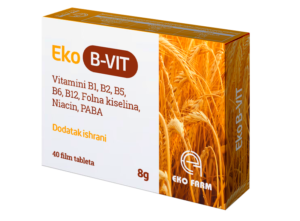What is vitamin B complex?
Vitamin B complex biological activity
Natural sources of B vitamins
Vitamin B complex dietary supplements
Recommended intake of vitamin B complex
Vitamin B complex deficiency and the problems it brings
Vitamin B complex hypervitaminosis
Vitamin B complex therapeutic uses
Possible side effects
Thanks to the many roles that they perform in the body, B complex vitamins are the real “heroes” among all vitamins. In case you didn’t know, they work best when they are all together, to be more precise – all 8 of them. However, if we want to maintain their good levels, we must know how to properly use them. The best way to do this is to know them well first, which you surely will, if you stay with us until the end of this text.
This fantastic octet is fully responsible for the proper functioning of our whole body on a daily basis, starting from the smallest molecules, to the most complex organs. Therefore, we owe them a lot, even though we are not aware of it very often.
What is vitamin B complex?
B vitamin family belongs to the class of water-soluble vitamins, whose main role is participating in the metabolism of protein, fat and sugar. It has eight members, who are named by the letter of the group they belong to ( “B”), followed by the accompanying number (1,2,3 ..), which was assigned to each vitamin chronologically, when it was discovered. The accepted commercial name for the group, that is often used, is the “B complex” or “B vitamin complex”, and it is consists of 8 following vitamins:
• Vitamin B1 (Thiamine)
• Vitamin B2 (Riboflavin)
• Vitamin B3 (Niacin)
• Vitamin B5 (Pantothenic acid)
• Vitamin B6 (Pyridoxine)
• Vitamin B7 (Biotin)
• Vitamin B9 (Folic acid)
• Vitamin B12 (Cyanocobalamin)
It is important to emphasize that all eight vitamins act as a functional unit. That is why it is vital to maintain their optimal ratio in the body. Because of their hydrosolubility (solubility in water), our body cannot store them, nor synthesize them, which makes them essential nutrients. We have to constantly provide fresh supplies of B vitamins to our body through a well-balanced diet and dietary supplements.
Vitamin B complex biological activity
B complex vitamins work in different fields in our body. They help us generate the energy from the food we eat, which we then use for the development and proper functioning of all the organs and tissues. This means that without sufficient amounts of B vitamins, we would not be able to complete a number of essential metabolic processes. B vitamins also have a particularly important role in preserving the functions of the following:
• nervous tissue
• heart
• muscles
• gastrointestinal tract (GIT)
• red blood cells
• GIT cells
• adrenal hormones and sex hormones
In addition to the above, regular intake of vitamin B complex provides normal growth and development of the whole body, especially in the period of intensive growth in children and adolescents. They help maintain the integrity of the structure and function of the skin by improving its circulation, stimulating regeneration, and allowing normal functioning of the sebaceous glands. They also have positive effect on the formation and growth of hair and nails, which makes them a common ingredient in cosmetic and dietary products for hair&nails’ care and regeneration.
Natural sources of B vitamins
Rich sources of almost all the B vitamins are unprocessed whole grain products, such as rye bread, oatmeal, corn flour or whole-wheat pasta. Nevertheless, in most Western countries there is a legally formalized practice to enrich all types of white flour and cereals (flakes) by an additional amount of these vitamins, which must be clearly indicated on the label in the form of health claims. The most commonly added vitamins are thiamine (vitamin B1), riboflavin (vitamin B2), niacin (vitamin B3) and folic acid.

In addition to whole grain products, excellent sources of B vitamins are the following foods:
• meat (pork)
• poultry (turkey)
• organ meats (pork / chicken liver)
• fish (tuna, salmon, trout)
• seafood
• legumes (soy, beans, peas)
• nutritional yeast
• milk and dairy products
• eggs
Special attention must be paid to vitamin B12, which is an exception to the other vitamins, due to the fact it is naturally found only in foods of animal origin, especially meat. This makes it a potentially deficient vitamin in the population of vegans. As it has a great role in the formation of red blood cells, and protection against anemia, people who do not bring in sufficient quantities of vitamin B12, such as vegans, are recommended an additional intake in the form of dietary supplements.
Vitamin B complex dietary supplements
The highest percentage of healthy adult population meets the daily needs for B vitamins by eating a well-balanced diet. However, certain groups of people, including children, adolescents and the elderly, often cannot consume sufficient amounts of these vitamins only from food. In children it is usually caused by poor appetite, and undiversified diet, while in the elderly population it is caused by a slower metabolism and malabsorption (decreased absorption of nutrients from the intestine). Therefore, as an additional source of B complex dietary supplements are often recommended to these vulnerable groups.
There are numerous products based on B vitamins available on Serbian market. Some of them contain only one B vitamin, while the others contain a combination of several vitamins, or even all eight B vitamins. Those with all eight B vitamins are frequently called “vitamin B complex”, and are prescribed most common. When choosing a dietary supplement, it is important to pay attention on individual share of all eight B vitamins in the final composition, because only optimally balanced B complex formulations can achieve maximum effect in the body. B complex vitamins should be used depending on the individual needs and under health provider’s advice upon the necessary dose, and duration of therapy. For most healthy individuals, dosing is done according to the Recommended Daily Allowance (RDA) values, and as for the duration of the treatment, it lasts usually a minimum of 1 to 3 months. Specific recommendations followed by strict medical supervision are applied for people at higher risk of vitamin B deficiency.
Recommended intake of vitamin B complex
All vitamins, including vitamin B complex, have Recommended Daily Allowance (RDA) values, which are calculated to meet the daily needs of 97% -98% of healthy adult human population. These values are set by various national health agencies, and may differ to some extent from country to country, due to the different lifestyles and eating habits.
According to the Serbian Recommendations for sanitary safety of dietary products (Official Gazette archive of RS no. 75/2015), the value of the Recommended Daily Allowance (RDA) for all eight B vitamins are shown in the table below, and slightly differ from European and American recommendations.
TABELA1
This means that exactly these values of B vitamins are enough daily intake for the greatest number of people. Using higher amounts of B vitamins than the RDA levels is also justified, and recommended to groups at higher risk of deficiency, such as:
• children and adolescents in the rapid growth phase
• older people (over 65 years old)
• people with diabetes (type I and II)
• vegans and vegetarians
• people with alcohol dependence
• professional athletes
• people exposed to increased psycho-physical stress
• people with poor appetite
• people suffering from anemia
Vitamin B complex deficiency and the problems it brings
Lack of B vitamins in the body – hypovitaminosis, is not common in developed countries, primarily due to a wide variety of foods and dietary supplements available, as well as the enrichment policy of adding B vitamins to certain foods. Nevertheless, in the aforementioned risk groups, there is a possibility of developing symptoms that could indicate hypovitaminosis. Depending on the vitamin from the group that is deficient, there may be a multitude of symptoms. The most common ones are shown in the following table:
TABELA2
* Neurological disorder (neural tube defect) in newborns caused by insufficient folic acid intake during pregnancy
Vitamin B complex hypervitaminosis
Thanks to their water solubility, B complex vitamins hypervitaminosis are rare, because the body excretes in the urine the quantity that it is not required. Nevertheless, harmful levels of vitamin B can be obtained more likely by using mega doses of dietary supplements, and eating enriched foods and beverages, than consuming a well-balanced diet. Therefore it is very important to strictly follow dosing recommendations indicated on the label.
Vitamin B complex therapeutic uses
Vitamin B complex in the form of dietary supplements is used particularly for the treatment of pre-existing lack of B vitamins in the body (vitamin deficiency).
Their use is also advised in all situations when there is:
Reduced intake of B vitamins (vegans, vegetarians, children and adults of poor appetite, people with impure and problematic skin)
Increased need for B vitamins (children and adolescents in the phase of intensive growth and development, diabetics, professional athletes, people exposed to increased physical and mental stress, people with alcohol dependence, convalescents after recovering from infectious diseases, or surgical interventions, chronic patients)
Insufficient / altered gastro-intestinal absorption (people over 65 years of age, people suffering from anemia due to a lack of vitamin B12)
Possible side effects
Although they are considered to be relatively safe for use, B complex vitamins (as well as all other supplements and medicines), can lead to unpleasant side effects in certain number of people. Fortunately, in the case of B vitamins, these side effects are both rare and mild, which greatly contributes to their widespread use.
Moderate side effects that may occur are the following: changes in urine color, frequent urination, diarrhea, abdominal pain, nausea, vomiting, itching and redness of the skin.
Severe side effects are much less common, but can occur in the form of allergic reactions followed at first by changes in the skin, and later swelling of the soft tissues, when it is urgent to contact a doctor.
The occurrence of side effects may be reduced, and often completely avoided, by strictly following the instructions for use, and consuming exactly prescribed doses.
by: mr ph Iva Majstorović, posted on April 8, 2016
References
1. Institute of Medicine. Food and Nutrition Board. Dietary Reference Intakes: Thiamin, Riboflavin, Niacin, Vitamin B6, Folate, Vitamin B12, Pantothenic Acid, Biotin, and Choline. Washington, DC: National Academy Press; 1998.
2. Navarra, Tova (1 January 2004).
https://books.google.rs/books?id=upI55jwytpQC&pg=PA155&redir_esc=y#v=onepage&q&f=false
3. NIH, U.S. National Library of Medicine; B Vitamins: MedlinePlus
https://www.nlm.nih.gov/medlineplus/bvitamins.html#summary
4. Thiamin – Health Professional Fact Sheet
https://ods.od.nih.gov/factsheets/Thiamin-HealthProfessional/
5. Roberta Agabio; Thiamine administration in alcohol-dependent patients
http://alcalc.oxfordjournals.org/content/40/2/155.long
6. Vitamini i minerali koji se mogu deklarisati i njihov preporučen dnevni unos (PDU); Prilog br. 1.
http://www.overa.rs/pravilnik-o-zdravstvenoj-ispravnosti-dijetetskih-proizvoda.html
7. Vitamin B Complex Supplements Side Effects
http://www.newhealthguide.org/Vitamin-B-Complex-Side-Effects.html
 Eko B-Vit is a dietary supplement in the form of film coated tablets, that contain all eight essential B complex vitamins. You may wonder why all eight? Because, thanks to the synergistic effect, only in this exact composition these vitamins may achieve their full effect, which is participating in a number of metabolic processes, which helps create energy for the functioning of all tissues from ingested food.
Eko B-Vit is a dietary supplement in the form of film coated tablets, that contain all eight essential B complex vitamins. You may wonder why all eight? Because, thanks to the synergistic effect, only in this exact composition these vitamins may achieve their full effect, which is participating in a number of metabolic processes, which helps create energy for the functioning of all tissues from ingested food.
